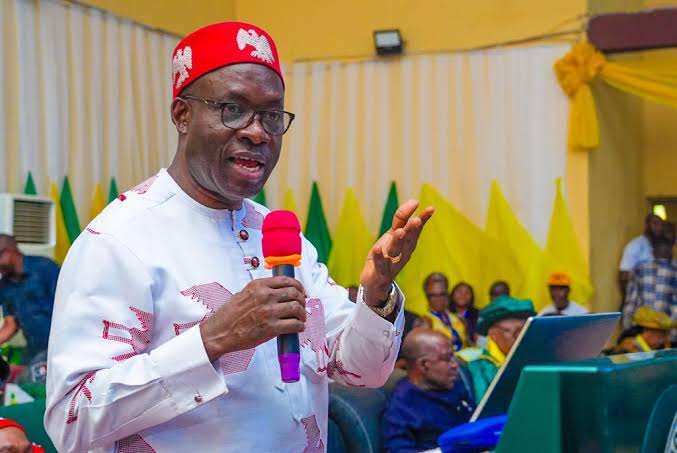The Anambra State Executive Council (ANSEC), under the leadership of Governor Charles Chukwuma Soludo, convened its 11th meeting on June 16, 2025, to deliberate on critical infrastructure and social development initiatives aimed at transforming the state. The council approved contracts totaling over ₦9.72 billion for projects addressing erosion, flood control, road rehabilitation, educational infrastructure, and public amenities. These decisions reflect the state’s commitment to tackling longstanding environmental and infrastructural challenges while fostering sustainable development.
A flagship project approved by ANSEC is the ₦3.5 billion contract awarded to Saidi Nigeria Limited for a 2.28 km road and erosion control initiative connecting Umunze to the Umuchu Bye-Pass in Orumba South Local Government Area. This project targets severe erosion and flooding that have plagued the region, threatening lives and livelihoods, particularly during the rainy season. The initiative includes advanced drainage systems and embankment reinforcements to ensure long-term resilience against environmental degradation.
In the education sector, the council allocated ₦718.6 million for the renovation of dilapidated structures at Nwafor Orizu College of Education, Nsugbe, in Anambra East Local Government Area. The contract was divided among three firms: Biggstruct Engineering Ltd. (₦263.7 million), Zonel Projects Ltd. (₦222.9 million), and Euro Energy Resources (₦208.5 million), each tasked with restoring specific facilities to modern standards. Additionally, ₦2.1 billion was approved for constructing access roads within the same institution to improve mobility and enhance the learning environment.
Road infrastructure received further attention with the approval of ₦97.3 million for the rehabilitation of Nya Ranch Road in Awka, the state capital, by the Anambra Road Maintenance Agency (ARMA). This project aims to restore the road’s functionality, which has deteriorated due to heavy traffic and poor drainage, causing inconvenience to residents and businesses. The council’s focus on road maintenance underscores its strategy to prioritize cost-effective repairs alongside new constructions.
Public amenities were also prioritized, with ₦528.6 million allocated for the completion of the Country Club at the Ekwulobia Stadium Complex in Aguata Local Government Area, awarded to Crystal Dove Construction Company Ltd. This project aims to create a recreational hub for residents, promoting social cohesion and economic activity in the region. Similarly, ₦65.6 million was approved for additional works at the Onitsha Specialist Hospital in Fegge, also awarded to Crystal Dove, to enhance healthcare delivery in one of the state’s busiest urban centers.
Traffic management infrastructure saw an investment of ₦55.1 million, allocated to the Anambra Road Traffic Management Agency (ARTMA) for installing modern traffic control systems across key urban areas. This initiative is part of a broader effort to reduce congestion, improve road safety, and enforce traffic regulations. The council also announced plans to retrain commercial drivers and blacklist those committing serious violations, aligning with the state’s goal of fostering disciplined road use.
Beyond physical infrastructure, ANSEC reaffirmed its commitment to the Anambra Rebirth Programme, a social reform initiative designed to restore core Igbo values such as integrity, industriousness, and communal responsibility. The programme, championed by Governor Soludo, seeks to address societal decay through public campaigns, community engagement, and policy interventions. Dr. Law Mefor, the Commissioner for Information, emphasized that the initiative would cultivate a new generation of citizens committed to ethical conduct and civic pride.
The approved projects address critical challenges highlighted by historical data on Anambra’s vulnerabilities. For instance, the 2022 floods, which affected 729,046 people and displaced 526,215 across the state, underscored the urgency of robust erosion and flood control measures. The Umunze-Umuchu project, in particular, responds to similar risks in Orumba South, where gully erosion has destroyed farmlands and homes.
The council’s investments in education align with Anambra’s reputation as a hub for academic excellence. Nwafor Orizu College of Education, established to train teachers, has faced infrastructural decay over the years, hampering its ability to deliver quality education. The ₦718.6 million renovation and ₦2.1 billion road projects aim to restore the institution’s prominence while improving access for students and staff.
Financial transparency was a key theme during the ANSEC meeting, with the council mandating strict oversight of all contracts to ensure value for money. Each project underwent rigorous evaluation by the state’s Public Procurement Board, chaired by the Secretary to the State Government, to guarantee compliance with budgetary and technical standards. This approach reflects Governor Soludo’s administration’s emphasis on accountability and prudent resource management.
The approved sum represents a significant investment in Anambra’s development, with projects strategically distributed across urban and rural areas to ensure inclusive growth. For example, while Awka and Onitsha benefit from road and hospital upgrades, rural communities like Umunze and Ekwulobia gain from erosion control and recreational facilities.
Stakeholder reactions, as reported in local media, have been largely positive, with community leaders in Orumba South praising the erosion control project as a lifeline for their region. However, some residents have called for accelerated timelines to ensure projects are completed before the next rainy season, which typically exacerbates flooding. The state government has assured citizens of timely execution, with contractors mobilized to commence work immediately.
The council’s decisions also align with Anambra’s broader economic vision under the Soludo administration, which prioritizes infrastructure as a catalyst for industrialization and job creation. The Ekwulobia Stadium Complex, for instance, is expected to attract private investments in hospitality and tourism, while improved roads and traffic systems will facilitate commerce in urban centers like Awka and Onitsha. These projects collectively aim to position Anambra as a model state for sustainable development in Nigeria.
Dr. Mefor, in a post-meeting briefing, reiterated that the Soludo administration remains people-focused, with policies designed to deliver tangible improvements in living standards. He highlighted the Anambra Rebirth Programme as a complementary effort to infrastructure development, noting that societal progress requires both physical and behavioral transformation. The programme’s rollout will include town hall meetings, school campaigns, and media sensitization to engage citizens across all demographics.




